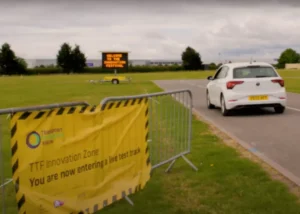The government is working hard to improve its understanding of Artificial Intelligence in transport, its potential and its dangers, as it looks to work out how to best use the technology.
Giving the keynote address at the Transport Technology Forum Conference in Leeds, the Department for Transport’s Deputy Chief Scientific Adviser, Dr Annette Pass talked about how technology can suddenly cause us to pivot how we look to the future, and AI is one such example.
“I think one of the things that is really important for us to do is to within our sector, is have a better understanding of what AI is, what it does, and how we use it,” she said, as she pointed to the Government’s £100 million investment into an AI task force looking at how the UK can have its own foundation language models.
“There was a news story about people being fearful about AI developing its own consciousness, that people who are working in AI should have consciousness training,” she said. “But in reality we are all using AI already – it’s in our phones whenever you text somebody and you see that predictive text bot, that’s what ChatGPT is doing, except it’s using the whole internet to help you. But it’s true there are areas in which AI is developing that we need to be very, very careful about.”
In her address, Dr Pass talked about how we are using a transport infrastructure that is more than a hundred years old, with a personal mobility model which has been built at the cost to the environment. “We need to keep people moving, keep Britain moving while not impacting on the environment,” she said. “We need to be much more complex on types of mobility, types of fuel.”
Dr Pass said that, in her opinion, transport IS technology, and that technology really supports transport. “We all now take for granted knowing where our deliveries are, where our train or bus is, where our family are,” she said. “We can find information online, and rehearse our journeys, which makes public transport more accessible to more people.”
“We are seeing transport as a system, and my role is to look at science, innovation and technology across the DfT,” she said, pointing to recent publications “Areas of research interest” which looks to improve transport for the user, reduce environmental impacts, grow and level up the economy and increase increase our global impact, while she also discussed how much data being generated, mainly by users and vehicles but also our own transport networks and how that fits into the new Transport Data Strategy.
“There is a lot to be said for releasing data to developers, as TfL has done,” Dr Pass explained. “But with great power comes great responsibility. We need to consider, is our data good enough? Sometimes we are reluctant to share data until we are really happy with it, so we need to be clear about confidence levels in data.”
(Picture – TTF)






















